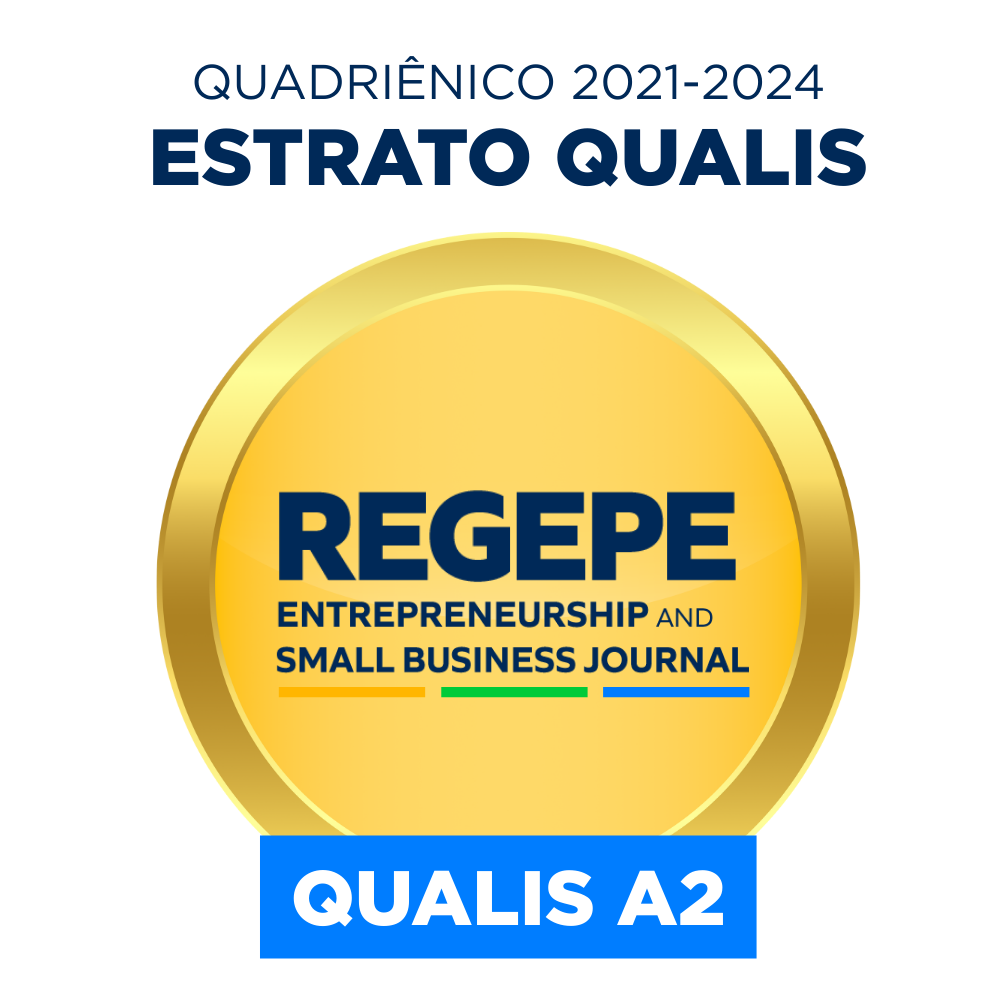Empreender com modos não Schumpeterianos (ou alternativos): Efetuação e Bricolagem para superar crises
DOI:
10.14211/ibjesb.e2344Palavras-chave:
Efetuação, Bricolagem, Limitação de recursos, Crises, Empreendedorismo de estilo de vida, Empreendedorismo socialResumo
Objetivo: o presente ensaio tem por finalidade apontar impedimentos do schumpeterianismo e potenciais dos modos não schumpeterianos da efetuação e da bricolagem para a superação de crises. Metodologia/abordagem: trata-se de um ensaio baseado na literatura disponível principalmente sobre efetuação (ou effectuation) e bricolagem empreendedoras, assim como em dados empíricos vindos de entrevistas semi-estruturadas com emprego de métodos qualitativos. Principais resultados: o texto argumenta que as abordagens da efetuação e da bricolagem são particularmente apropriadas e úteis para a superação da limitação de recursos, inclusive no agravamento dela ocorrido em crises. Com o uso de exemplos e um caso reais, constitui uma base para novos estudos e a disseminação de conhecimentos, podendo servir de inspiração para o emprego mais consciente, disseminado e aperfeiçoado desses modos não schumpeterianos de empreender. Contribuições teóricas/metodológicas: o estudo oferece argumentos, um quadro teórico de base com elementos de revisão de literatura e dados empíricos propícios para novas pesquisas promissoras quanto à efetuação e à bricolagem. Relevância/originalidade: o ensaio apresenta relações conceituais promissoras e aspectos da realidade que são frequentes e relevantes, mas ainda não explorados em estudos nacionais e internacionais, em particular por tratar da efetuação e da bricolagem como modos de superação da limitação de recursos e de crises no empreendedorismo de estilo de vida (EEV) e no empreendedorismo social. Contribuições sociais/para a gestão: geração de maior sensibilização quanto à importância e à necessidade de pesquisas e de emprego da efetuação e da bricolagem empreendedoras, propiciando-se práticas úteis para se fazer muito com pouco, superar limitações de recursos e vencer crises.
Classificação JEL: L26
Downloads
Referências
Akinboye, A. K., & Morrish, S. C. (2022). Conceptualizing post-disaster entrepreneurial decision-making: Prediction and control under extreme environmental uncertainty. International Journal of Disaster Risk Reduction, 68, 102703. https://doi.org/10.1016/j.ijdrr.2021.102703
Ariely, D. (2010). Predictably irrational: The hidden forces that shape our decisions. New York, NY: Harper Perennial.
Ateljevic I. & Doorne S., (2000). Staying within the Fence: Lifestyle Entrepreneurship in Tourism. Journal of Sustainable Tourism, 8(5), 378- 392. https://doi.org/10.1080/09669580008667374
Baker, T., & Nelson, R. E. (2005). Creating something from nothing: resource construction through entrepreneurial bricolage. Administrative Science Quarterly, 50(3), 329-366. https://doi.org/10.2189/asqu.2005.50.3.329
Cardon, M. S., Wincent, J., Singh, J., & Drnovsek, M. (2009). The nature and experience of entrepreneurial passion. Academy of management Review, 34(3), 511-532. https://doi.org/10.5465/AMR.2009.40633190
Carter, N. M., Gartner, W. B., & Reynolds, P. D. (1996). Exploring start-up event sequences. Journal of Business Venturing, 11, 151-166. https://doi.org/10.1016/0883-9026(95)00129-8
Ciasullo, M. V., Montera, R., & Pellicano, M. (2019). To what extent are heretics lifestyle entrepreneurs? Insights from tourism SMEs in remote destinations. Piccola Impresa/Small Business, (2). https://doi.org/10.14596/pisb.309
Dacin, M., P. Dacin, and P. Tracey. 2011. “Social Entrepreneurship: A Critique and Future Directions.” Organization Science, 22 (5): 1203–1213. http://www.jstor.org/stable/41303113
Damasio, A. (1994). Descartes’s error: Emotion, reason, and the human brain. London: Vintage Books.
Dew, N., & Sarasvathy, S. D. (2005). Entrepreneurial logics for a technology of foolishness. Scandinavian Journal of Management, 21(4), 385-406. https://doi.org/10.1016/j.scaman.2005.09.009
Down, S., & Giazitzoglu, A. (2014). Identity and entrepreneurship. Routledge Companion to Entrepreneurship. London: Routledge, 102-115.
Fisher, G. (2012). Effectuation, causation, and bricolage: A behavioral comparison of emerging theories in entrepreneurship research. Entrepreneurship Theory and Practice, 36(5), 1019-1051. https://doi.org/10.1111/j.1540-6520.2012.00537.x
Gonzalez, K., & Winkler, C. (2018). The entrepreneurial breaking point: undergoing moments of crisis. Management Decision.
Greco, S. M. S. S., Morini, C., Lima, E., Inácio, E. ; Onozato, É., Bastos Junior, P. A., Lopes, R. M. A., & Souza, V. L. GEM - Empreendedorismo no Brasil 2020. 1. ed. Curitiba: IBQP, 2021.
Guercini, S., & Ceccarelli, D. (2020). Passion driving entrepreneurship and lifestyle migration: Insights from the lutherie of Cremona. Journal of International Entrepreneurship, 1-20. https://doi.org/10.1007/s10843-020-00269-1
Helgadóttir, G., & Sigurðardóttir, I. (2008). Horse‐based tourism: Community, quality and disinterest in economic value. Scandinavian Journal of Hospitality and Tourism, 8(2), 105-121. https://doi.org/10.1080/15022250802088149
Henricks, M. (2002). Not just a living: The complete guide to creating a business that gives you a life. Cambridge, MA: Perseus.
Hindle, K., & Senderovitz, M. (2010). Unifying three contending approaches to explaining early stage entrepreneurial decision-making and behaviour. In The Babson College Entrepreneurship Research Conference (BCERC), Lausanne, Switzerland: Babson College.
Hota, P. K. (2021). Tracing the Intellectual Evolution of Social Entrepreneurship Research: Past Advances, Current Trends, and Future Directions. Journal of Business Ethics, 1-23. https://doi.org/10.1007/s10551-021-04962-6
Janssen, F., Fayolle, A., & Wuilaume, A. (2018). Researching bricolage in social entrepreneurship. Entrepreneurship & Regional Development, 30(3-4), 450-470. https://doi.org/10.1080/08985626.2017.1413769
Jones, P., Ratten, V., & Hayduk, T. (2020). Sport, fitness, and lifestyle entrepreneurship. International Entrepreneurship and Management Journal, 16(3), 783-793. https://doi.org/10.1007/s11365-020-00666-x
Klapper, R., Upham, P., & Kurronen, K. (2018). Social capital, resource constraints and low growth communities: lifestyle entrepreneurs in Nicaragua. Sustainability, 10(10), 3813. https://doi.org/10.3390/su10103813
Korber, S., & McNaughton, R. B. (2017). Resilience and entrepreneurship: a systematic literature review. International Journal of Entrepreneurial Behavior & Research, 24(7), 1129-1154. https://doi.org/10.1108/IJEBR-10-2016-0356
Langevang, T., & Namatovu, R. (2019). Social bricolage in the aftermath of war. Entrepreneurship & Regional Development, 31(9-10), 785-805. https://doi.org/10.1080/08985626.2019.1595743
Lévi-Strauss, C. (1962). The savage mind. Chicago: The University of Chicago Press.
Lima, E., Nelson, R., & Lopes, R. M. A. (2020). Inesperadas sinergias e o sub-ótimo: bricolagem e efetuação no empreendedorismo de estilo de vida. Anais do EGEPE - Encontro de Estudos sobre Empreendedorismo e Gestão de Pequenas Empresas.
Mair, J., & Martí, I. (2006). Social Entrepreneurship Research: A Source of Explanation, Prediction, and Delight. Journal of World Business, 41(1), 36-44. https://doi.org/10.1016/j.jwb.2005.09.002
Malsch, F., & Guieu, G. (2019). How to get more with less? Scarce resources and high social ambition: effectuation as KM tool in social entrepreneurial projects. Journal of Knowledge Management, 23(10), 1949-1964. https://doi.org/10.1108/JKM-12-2018-0745
Marcketti, S. B., Niehm, L. S., & Fuloria, R. (2006). An exploratory study of lifestyle entrepreneurship and its relationship to life quality. Family and Consumer Sciences Research Journal, 34(3), 241-259. https://doi.org/10.1177/1077727X05283632
McMullen, J. S., & Kier, A. S. (2016). Trapped by the entrepreneurial mindset: Opportunity seeking and escalation of commitment in the Mount Everest disaster. Journal of Business Venturing, 31(6), 663-686. https://doi.org/10.1016/j.jbusvent.2016.09.003
Michaelis, T. L., Carr, J. C., Scheaf, D. J., & Pollack, J. M. (2020). The frugal entrepreneur: A self-regulatory perspective of resourceful entrepreneurial behavior. Journal of Business Venturing, 35(4), 105969. https://doi.org/10.1016/j.jbusvent.2019.105969
Moss, T. W., Short, J. C., Payne, G. T., & Lumpkin, G. T. (2011). Dual Identities in Social Ventures: An Exploratory Study. Entrepreneurship Theory and Practice, 35(4), 805-830. https://doi.org/10.1111/j.1540-6520.2010.00372.x
Mouraviev, N., & Avramenko, A. (2020). Lifestyle entrepreneurs: Unpacking their potential for deprived communities. Entrepreneurship for Deprived Communities, Bingley: Emerald Publishing Limited, pp. 163-188.
Nelson, R., & Lima, E. (2020). Effectuations, social bricolage and causation in the response to a natural disaster. Small Business Economics. https://doi.org/10.1007/s11187-019-00150-z
Pearson, C. M., & Clair, J. A. (1998). Reframing crisis management. Academy of Management Review, 23(1), 59-76. https://doi.org/10.2307/259099
Quarantelli, E. I. (1988). Disaster crisis management: A summary of research findings. Journal of Management Studies, 25: 373-385. https://doi.org/10.1111/j.1467-6486.1988.tb00043.x
Read, S., Song, M., & Smit, W. (2009). A meta-analytic review of effectuation and venture performance. Journal of Business Venturing, 24(6), 573-587. https://doi.org/10.1016/j.jbusvent.2008.02.005
Sarasvathy, S. (2001). Causation and effectuation: toward a theoretical shift from economic inevitability to entrepreneurial contingency. Academy of Management Review, 26, 243-263. https://doi.org/10.2307/259121
Sarasvathy, S. D., Forster, W., & Ramesh, A. (2020). De cachos dourados a Gump: mecanismos empreendedores para empreendedores do dia a dia. Revista de Empreendedorismo e Gestão de Pequenas Empresas, 9(1), 189-220. https://doi.org/10.14211/regepe.v9i1.1803
Schumpeter, J.A. (1934). The theory of economic development. Cambridge, MA: Harvard University Press.
Servantie, V., & Rispal, M. H. (2018). Bricolage, effectuation, and causation shifts over time in the context of social entrepreneurship. Entrepreneurship & Regional Development, 30(3-4), 310-335. https://doi.org/10.1080/08985626.2017.1413774
Shepherd, D. A., & Williams, T. (2020). Entrepreneurship responding to adversity: Equilibrating adverse events and disequilibrating persistent adversity. Organization Theory, 1(4). https://doi.org/10.1177/2631787720967678.
Shrivastava, P., Mitroff, I., Miller, D., & Miglani, A. (1988). Understanding industrial crises. Journal of Management Studies, 25: 285-303. https://doi.org/10.1111/j.1467-6486.1988.tb00038.x
Simon, H. A. (1947). Administrative behavior: A Study of decision making processes in administrative organization. New York: The Macmillan Company.
Smith, D. J., & Blundel, R. K. (2014). Improvisation and entrepreneurial bricolage versus rationalisation: A case-based analysis of contrasting responses to economic instability in the UK brass musical instruments industry. Journal of General Management, 40(1), 53-78. https://doi.org/10.1177/030630701404000104
Stinchcombe, A. L. (1965). Social structure and organizations. March, J. (Ed.) Handbook of Organizations, Chicago, IL: Rand McNally, pp.142-193.
Storr, V. H., Haeffele-Balch, S., & Grube, L. E. (2016). Community revival in the wake of disaster: Lessons in local entrepreneurship. Springer.
Tsilika, T., Kakouris, A., Apostolopoulos, N., & Dermatis, Z. (2020). Entrepreneurial bricolage in the aftermath of a shock. Insights from Greek SMEs. Journal of Small Business & Entrepreneurship, 32(6), 635-652. https://doi.org/10.1080/08276331.2020.1764733
Welter, C., Mauer, R., & Wuebker, R. (2016). Bridging behavioral models and theoretical concepts: Effectuation and bricolage in the opportunity creation framework. Strategic Entrepreneurship, 10(1), 5-20. https://doi.org/10.1002/sej
Yitshaki, R., & Kropp, F. (2016). Entrepreneurial passions and identities in different contexts: a comparison between high-tech and social entrepreneurs. Entrepreneurship & Regional Development, 28(3-4), 206-233. https://doi.org/10.1080/08985626.2016.1155743
Downloads
Publicado
Métricas
Visualizações do artigo: 2205 PDF downloads: 525 PDF (English) downloads: 546
Como Citar
Edição
Seção
Licença
Copyright (c) 2022 Edmilson de Oliveira Lima

Este trabalho está licenciado sob uma licença Creative Commons Attribution 4.0 International License.
Autores que publicam nesta revista concordam com os seguintes termos:
- O(s)/A(s) autor(es)/autora(s) autorizam a publicação do texto na revista;
- A revista não se responsabiliza pelas opiniões, ideias e conceitos emitidos nos textos, por serem de inteira responsabilidade de seus autores/autoras;
- Autores/autoras mantêm os direitos autorais e concedem à revista o direito de primeira publicação, com o trabalho publicado sob a Licença CC BY 4.0
, que permite o compartilhamento do trabalho com reconhecimento da autoria e publicação inicial nesta revista;
- Autores/autoras são permitidos e encorajados a postar seu trabalho (Versão submetida, Versão aceita [Manuscrito aceito pelo autor/autora] ou Versão publicada [Versão do registro]) online, por exemplo, em repositórios institucionais ou preprints, pois isso pode levar a trocas produtivas, bem como a citações anteriores e maiores de trabalhos publicados. A REGEPE pede como condição política para os autores/autoras que indiquem/vinculem o artigo publicado com DOI. Veja o Efeito do Acesso Livre.
















